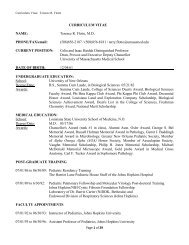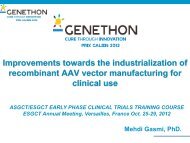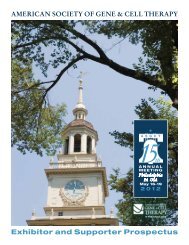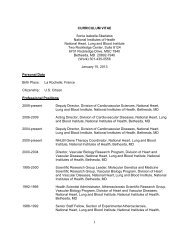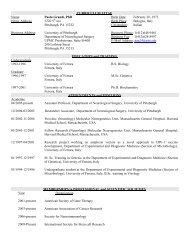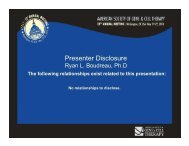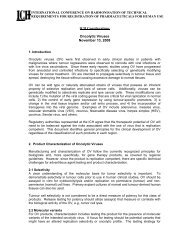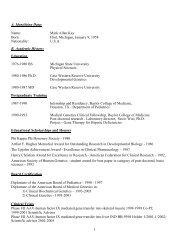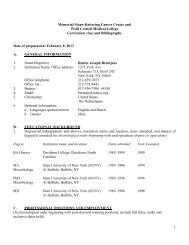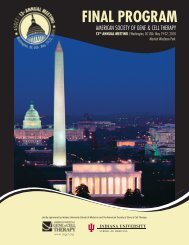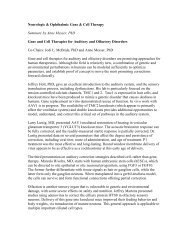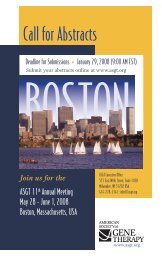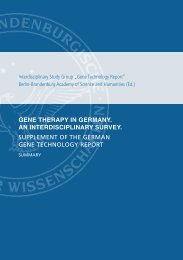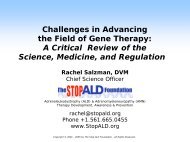Final Program - American Society of Gene & Cell Therapy
Final Program - American Society of Gene & Cell Therapy
Final Program - American Society of Gene & Cell Therapy
Create successful ePaper yourself
Turn your PDF publications into a flip-book with our unique Google optimized e-Paper software.
<strong>Program</strong> Schedule, Saturday, May 18, 2013<br />
Aliasger K. Salem, PhD<br />
Adjuvants for Vector-Mediated Cancer Immunotherapy<br />
This presentation will cover the use <strong>of</strong> adjuvants such as biodegradable particles and oligonucleotides to enhance the magnitude <strong>of</strong><br />
antigen-speciic anti-tumor CD8+ T-cell responses generated from treatment with adenovirus based vaccines. The presentation will<br />
also discuss the use <strong>of</strong> strategies to suppress negative regulatory elements within the tumor such as myeloid derived suppressor<br />
cells (MDSCs) and regulatory T-cells (Treg) to augment the anti-tumor activity generated by treatment with adenovirus based<br />
vaccines.<br />
Andrew Geall, PhD<br />
Non-viral Delivery <strong>of</strong> Self-amplifying RNA Vaccines<br />
Novartis has developed the SAM(tm) vaccine platform. The Platform takes advantage <strong>of</strong> cell-free RNA production from a<br />
transcription reaction and delivery with a synthetic delivery system. The broad utility <strong>of</strong> this novel vaccine technology has been<br />
demonstrated with genes encoding antigens from several pathogens and found to elicit broad and potent protective immune<br />
responses. Responses are comparable to a viral delivery technology, but without the inherent limitations <strong>of</strong> viral vectors.<br />
Scientific Symposium 433<br />
1:45 pm - 3:45 pm<br />
ROOM: BALLROOM D<br />
Host <strong>Cell</strong> Responses to Viral Vectors<br />
CO-CHAIRS: John T. Gray, PhD and Dmitry M. Shayakhmetov, PhD<br />
SPEAKERS<br />
Vojo Deretic, PhD<br />
Autophagy - A Biological Paradigm for Everyone<br />
Autophagy is a homeostatic process that continuously cleanses the cytosol by removing defunct organelles, protein aggregates,<br />
microbial invaders, and endogenous sources <strong>of</strong> inlammation. It also supplies the cell with alternative sources <strong>of</strong> energy and<br />
nutrients by auto-digestion <strong>of</strong> the cytoplasm during starvation. Autophagy is <strong>of</strong> signiicance in cancer, aging, neurodegeneration,<br />
metabolic disorders, inlammatory disease such as Crohn’s disease, and infectious diseases. The presentation will cover the<br />
pathway, its connections to disease, and focus on anti-inlammatory aspects <strong>of</strong> autophagy.<br />
Roland W. Herzog, PhD<br />
Innate Immunity to AAV Vectors<br />
Rapid sensing <strong>of</strong> pathogen-associated molecular patterns by the innate immune system is a mechanism to quickly shut down<br />
a viral infection via inlammatory responses or IFN I signaling. While a major concern for other viral gene transfer vectors,<br />
innate responses to AAV are very short-lived and weak. Nonetheless, TLR9 sensing <strong>of</strong> the AAV genome has emerged as a critical<br />
component <strong>of</strong> the response, and evidence for IFN I induction, induction <strong>of</strong> NF-kB and expression <strong>of</strong> inlammatory cytokines has<br />
been obtained. Importantly, immune responses to vector and in some cases also the transgene product are impacted by innate<br />
immunity.<br />
Saturday, May 18, 2013<br />
John C. Bell, PhD<br />
Innate Immunity and Oncolytic Viruses<br />
Oncolytic Viruses have been engineered or selected to speciically replicate in and kill tumour cells. This selectivity is <strong>of</strong>ten based<br />
upon aberrant signalling pathways that are characteristic <strong>of</strong> malignant cells. However, normal cells found within the tumour<br />
microenvironment are exposed to constitutive and elevated levels <strong>of</strong> cancer cell derived growth factors leading to a disruption <strong>of</strong><br />
normal which in turn can lead to overstimulation <strong>of</strong> normal cellular regulatory pathways. We have found that both neo-vascular<br />
endothelial cells and cancer associated ibroblasts are sensitized to oncolytic virus infection and killing following exposure to<br />
tumour cell derived growth factors. The molecular and biological consequences <strong>of</strong> this sensitization will be discussed.<br />
Dmitry M. Shayakhmetov, PhD<br />
Sensing <strong>of</strong> Endosomal Rupture by the Host<br />
To achieve therapeutic beneits using gene delivery vectors, both viral and non-viral vectors must be able to eficiently<br />
penetrate through the plasma membrane <strong>of</strong> target cells and deliver the therapeutic cargo into cytosolic and/or nuclear cellular<br />
compartments. However, dedicated molecular sensors may exist that detect perturbations <strong>of</strong> the integrity <strong>of</strong> the plasma membrane<br />
and endosomal compartments within the cell. When triggered, these sensors activate innate immune defense mechanisms which<br />
can limit the eficacy <strong>of</strong> the therapy. We will review current understanding <strong>of</strong> the molecular mechanisms that are triggered within<br />
the cell upon virus entry, and present new data on molecular sensors <strong>of</strong> adenovirus-mediated endosome rupture.<br />
74<br />
<strong>Final</strong> <strong>Program</strong> SALT LAKE CITY, UTAH May 15–18, 2013



